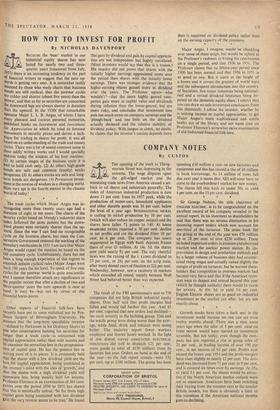COMPANY NOTES By CUSTOS THE opening of the week in
Throg- morton Street was depressing in the ,15.;, extreme. The wage disputes upset the gilt-edged market and the worsening trade news from America caused a set- back in oil shares and industrials generally. The index of American industrial production is now down 11 per cent. from its 1957 peak, while the production of motor-cars, household appliances and other durable goods was 16 per cent. below the level of a year ago. INTERNATIONAL NICKEL is cutting its nickel production by 10 per cent. (which will also reduce its copper output) and the shares have fallen 71 points to 140. At home BRADFORD DYERS reported a 30 per cent. decline in net profits and cut the dividend feom 10 per cent. to 6 per cent. The company has assets sequestered in Egypt with bank deposits frozen there of over million. At 14s. 3d. the shares now yield nearly 81 per cent. The only cheerful news was the raising of the J. LYONS dividend to 25 per cent., or 28+ per cent. on the scrip issue, after many dismal years of fixation at 224 per cent. Wednesday, however, saw a recovery in markets which extended all round, mainly because Wall Street had behaved better than was expected.
* * *
The result of the FBI questionnaire sent to 750 companies did not help British industrial equity shares. Over half said that profit margins had fallen and would fall further this year. And 45 per cent. reported that new orders had declined— the most severely in the building group. This and the textile group were doing worse than the aver- age, while food, drink and tobacco were doing better. The majority report fewer workers employed and shorter hours worked. In the light of this dismal survey ASSOCIATED ELECTRICAL INDUSTRIES did well to dispatch 121 per cent. more goods (a total of £150 million) from its factories last year. Orders on hand at the end of the year—so the full !upon reveals—were 15+ per cent. up at £180 million. The group has been spending £10 million a year on new factories and equipment and this has caused a rise of £6 million in bank borrowings, As £4 million of notes fall due next year it seems that NEI will soon have to come to the overburdened market for new money. The shares fell this week to under 50s. to yield 6 per cent. on the 15 per cent. dividend.
* *
Sir George Nelson, the able chairman of ENGLISH ELECTRIC, is to be congratulated on the excellent record of his company revealed in the annual report. In his statement to shareholders he said that there was no serious diminution in his incoming export orders which now account for one-third of the turnover. The order book for the group at the end of the year was £70 million up or 28 per cent. at over £250 million. These included important orders in aviation and electrical traction and the nuclear power station. By im- provement in design and production methods and by a larger volume of business they had counter- acted rising wages and actually raised slightly the margin of profit on turnover, but he warned share- holders that competition in overseas markets had become very fierce and that if the American reces- sion were to deepen and extend beyond this year (which he thought unlikely) there would be cause for anxiety. At 49s. 9d. to yield 5.6 per cent. English Electric shares are as good an industrial investment as the market can offer, but are not exactly cheap.
* * *
Growth stocks have taken a back seat in the investment world because no one can see even twelve months ahead. There was a time some years ago when the offer of 5 per cent. yield on FORD MOTOR would have started an investment scramble; But not today, even though the com- pany has just reported a rise in group sales of 21 per cent., in trading income of over 100 per cent., in net income of 93 per cent. Profits now exceed the boom year 1954 and the profit margins have risen slightly to nearly 12 per cent. The divi- dend was increased from 74 per cent. to 9 per cent, and is covered six times over by earnings. At 35s. to yield 5.1 per cent. the shares would be attrac- tive if the North American market outlook were not so uncertain. Americans have been switching their buying from the monster cars to the smaller British models, but there is obviously a limit to this transition if the American national incOma goes on declining.


































 Previous page
Previous page